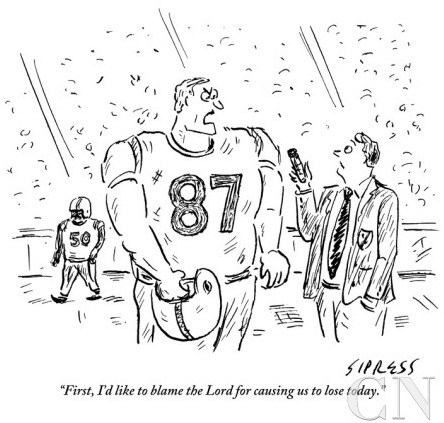
Click here to listen to this week’s episode of The Mockingcast, in which Scott interviews Krista Tippett, host of NPR’s On Being. Seriously!
1. Even if you’re not as absorbed in the Olympics as yours truly, you can’t have spent much time on the interwebs this week without hearing something about what’s happening in the pool down in Rio. The US is dominating to an almost embarrassing extent, and you-know-who just keeps on winning gold medals. Since we didn’t highlight it back in June, do read Karen Crouse’s “Seeking Answers, Michael Phelps Finds Himself” if you haven’t had a chance, as it does a thorough job of relaying his spiritual trajectory these past couple years. It’s as readymade a sermon illustration as one is likely to find, albeit with the caveat that this is a human being (we think) whose story is far from over:
“[After the London games in 2012 Michael] had no idea what to do with the rest of his life,” [Coach Bob] Bowman said. “It made me feel terrible. I remember one day I said: ‘Michael, you have all the money that anybody your age could ever want or need; you have a profound influence in the world; you have free time — and you’re the most miserable person I know. What’s up with that?’ ”
“I didn’t see me as me,” Phelps said. “I saw me as everybody else did — as an all-American kid. Let’s be honest. There’s not a single human being in the world that’s like that.”

Michael later admitted to harboring suicidal thoughts during this period, fueling self-destructive behavior that ended him up in rehab. While there, his friend (Baltimore Ravens linebacker) Ray Lewis gave him a copy of Rick Warren’s The Purpose Driven Life, which Phelps credits with, well, saving his life. He explains:
[The book has] turned me into believing there is a power greater than myself and there is a purpose for me on this planet … It helped me when I was in a place where I needed the most help.
ESPN relates the details a whole lot better than I ever could in the 15 minute documentary they released a few weeks ago, The Evolution of Michael Phelps. To skip over the Good Friday portion (straight to Easter), fast forward to the 9 minute mark:
https://www.youtube.com/watch?v=BVgTYmBMBD8
Of course, the subsequent clamoring to claim ‘the greatest of all time’ as a co-religionist has been as distasteful as it is predictable. Fortunately, Phelps is far from the only athlete giving the Almighty a shout-out this week. Religion News Service has been providing a running tally in fact. My favorites moments thus far have been Simone Manual’s joyous thanksgiving after winning gold in the 100 Free last night, as well as what David Boudia and Steele Johnson said to reporters after winning silver in Synchronized Diving:
“We both know our identity is in Christ. Going into this event knowing that my identity is rooted in Christ and not the result of this competition just gave me peace. And it let me enjoy the contest. God’s given us a cool opportunity, and I’m glad I could come away with an Olympic silver medal.”
There you have it. As far as Olympic odd-and-ends, Science of Us reports that The Olympic Winners’ Facial Expressions Are a Scientific Mystery. The Atlantic unpacked the whole cupping phenomenon that has lent the proceedings such a bizarre aspect. I appreciated Chloe Angyal’s reflection in the Times about what gymnastics taught her about the perils of perfectionism and the double-bind of the little-law, especially as it relates to young women.

2. The Atlantic also published a great article by Alison Gopnik “In Defense of Play”. What at first reads like yet another attempt to pitch play as something that benefits our cognitive resumes, it takes a wonderful turn toward the end. You could almost sub out “play” for any form of spiritual discipline (“prayer”, “reading”, “service”) and the impact would be the same:
There is a notoriously Puritan streak in American culture. We have a knack for taking what are simple pleasures in other cultures, from food to walks to sex, and turning them into strenuous work projects. We follow a Mediterranean diet instead of just eating spaghetti and tomatoes, take aerobic hikes instead of after-dinner promenades, and practice The Joy of Sex instead of, well, the joy of sex. So American parents often act as if play is only valuable if it will produce predictable outcomes.
This isn’t just true about our attitude toward child’s play. We also tend to treat adult play—sport or art or science—as a disguised form of work, something that only has value because it eventually leads to some practical end—physical health or moral uplift.
The irony is that over the long term, both children’s and adults’ play does lead to practical benefits. But it does this precisely because the people who play, whether they are children or adults, aren’t aiming at those practical benefits. The fundamental paradox of play is that in order to be able to reach a variety of new goals in the long run, you have to actively turn away from goal seeking in the short run.
3. Are You Ready for Mel Gibson’s Comeback? asks Kevin Lincoln over at Vulture, in response to Gibson’s apparently quite strong new film Blood Father, as well as the debut of the Hacksaw Ridge trailer last week, the first feature he’s directed since 2006’s excellent Apocalypto. While I for one was surprised by how earnest an effort the article made to empathize with the degraded actor, I was especially struck by what it revealed about how people conceive of forgiveness (in relation to ‘deserving’), ht BJ:
In the aftermath of his five-year fall from grace, Gibson’s story became a case study of what happens when a guy plagued by anger and alcohol issues becomes one of the most famous men in the world. Vanity Fair dove deep into the skid, speaking with most of his closest collaborators — nearly all of whom offered up some version of “Mel is a good guy, but he’s got major issues — but seriously, he’s a good guy.” It isn’t hard to see the (alleged) logic of what went down: a) his grueling auteur efforts led to b) renewed drinking, and personal turmoil led to c) the ($400 million) dissolution of his (seven-children-yielding) marriage, which led to d) a big-time crack-up, leaving the guy Jodie Foster called “the most loved man in the film business” a nearly total pariah…
But there’s still a way to get people to forgive — or at least compartmentalize — your behavior, and it’s to convince them that you’re worth it. That gets back to the other reason why Gibson’s comeback feels somewhat inevitable, and explains why his disintegration was so spectacular in the first place: This dude used to be really famous. He won Best Director and Best Picture for Braveheart; he was an international movie star who commanded $20 million a role; he was a former Sexiest Man Alive. The industry needs people like that, actors with the charisma Gibson demonstrates in Blood Father and directors who can win Oscars, and neither is exactly growing on trees. If Gibson makes movies that moneymen want to finance, actors want to act in, and the public wants to see, those movies will allow supporters to justify his return to the spotlight and some semblance of normalcy. It’s just another version of the debate over Woody Allen: It’s the moral onus of patronage reductio ad absurdum. Sure, these might be bad people … but their work is definitely good.
In other words, if Gibson has a shot at being forgiven en masse, it will happen in response to his talent rather than, well, his need. ‘Merited Forgiveness’ as opposed to what we might call ‘Idiot Forgiveness’ or simply, um, forgiveness. It’s worth revisiting Robert Downey Jr’s (and Robert Capon’s) stance on the matter.
4. While we’re on the celebrity train, Christianity Today interviewed Jeannie Gaffigan, wife of comedian Jim and co-writer on all he does, who Jim has memorably described as a “Shiite Catholic”. I caught up on the show recently and highly recommend it. Probably the most authentic depiction of actual church I’ve ever seen on the small screen, this side of Rev. The marriage counseling episode, for example, is a Frank and Debra level illustration of yesterday’s post on relational projection, all in the context of a pastoral care appointment. Genuinely hilarious too. Jeannie describes Jim’s coming to faith:
He developed a relationship with a priest who was very young and cool and hip and understanding. Jim began telling me, “You know, I wish I had a priest like this in my life when I was a kid. I just remember being in the back of church and my father giving me dirty looks because I [wasn’t] sitting up straight. If I did anything wrong, I was going to hell.” [Jim] had this big revelation about a merciful God who is there to show him mercy. He was there to love him and to guide him—to pretty much be in control.
5. In humor, just after last Friday’s weekender was published, The Great Cargo Shorts War of 2016 kicked off, and before things got nasty, they got funny. The Establishment ran a clever guide to “‘Toddler Grandma Style,’ The Fashion Approach That Will Set You Free”, something that we talk a bit about on this week’s episode of The Mockingcast. McSweeneys reported that “The Crippling Anxiety On the West Coast is Just as Good as the Crippling Anxiety in New York.” Oh and the Babylon Bee gave us “CrossFit Added To Cult Watchlist”.
6. The Atlantic made a few sympathetic observations on the #FirstSevenJobs meme that swept social media this past week. On the one hand the exercise demonstrates the circuitous, unplanned routes that all our lives take. On the other, there can be an unsettling aspect of self-aggrandizement to it:
What is compelling about this snapshot of career trajectories is that [the hashtag], by nature, emphasizes a career as a journey and not necessarily the logical result of a blinkered, do what you love mantra. Nevertheless, beneath many of the entries hummed a sense of pride. Is this particular brand of navel-gazing a good thing or a bad thing? It depends. Writing in The Atlantic earlier this year, Robert H. Frank copped E.B. White’s famous remark on the divide between those who see themselves as industrious and those who see themselves as lucky. “Luck is not something you can mention in the presence of self-made men,” White once wrote.
Citing some studies, Frank offers that fixating on one’s own mythology without also acknowledging good fortune apparently makes a person “less generous and public-spirited” and less willing to invest in what might help deliver success to others. “Happily, though,” he added, “when people are prompted to reflect on their good fortune, they become much more willing to contribute to the common good.”
For the record: lifeguard, babysitter, library assistant, college housing lackey, alcohol policy researcher, music reviewer, youth minister.
7. Social Science Study of the Week is probably “People Are Happiest at Work When They’re Treated Just a Little Bit Like Toddlers”
8. Finally, Seth Rogen’s animated spoof Sausage Party has been getting positive reviews, most of which suggest that the admittedly filthy Pixar take-off has a lot to say about not just religion but theology. Hmmm… I’ll be interested to hear what people think.
Strays
- A Week in the Life of Whit Stillman!
- According to a CDC report today, the number of babies born per female (ages 15 to 44) in the U.S. is the lowest ever.
- Random Film Recommendation: Sing Street. Just splendid.
- Awesome “80s icons in the 2010s” illustrations are the work of Tom Ward.
- Matthew Walther at The Federalist made my week when he informed the Internet that Nobody’s Ever Heard Of The Best Bay City Rollers Album. One trip to the record store later, I can confirm his claim. PTL.
- SAVE THE DATE: Our Fall Conference in Oklahoma City happens October 28-29. More details soon.
https://www.youtube.com/watch?v=HF4NeakVLRc

COMMENTS
Leave a Reply












